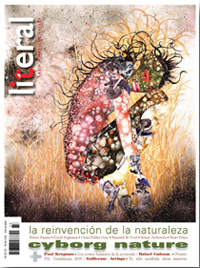LITERAL 19
Cyborg Nature / La reinvención de la naturaleza
In the 1960s, Manfred E. Clynes and Nathan S. Kline published an article entitled “Cyborgs and Space,” where they argued that the human species was already on a path of participant evolution (a deliberate process to redesign the human brain and body via technological means). One of the most important contributions they made, besides coining the term Cyborg, was the notion that in the midst of new technologies, humans could and should have the choice to morph into an entity that they later called the Posthuman–a concept that originated in the fields of science fiction, futurology, contemporary art and philosophy. To see the phenomenon occurring, we need look no further than the course of human history. From the most primitive prosthetic limb to the most advanced electronic gadget, we have been constantly expanding the definition of the human being as we surpass our own limitations. The time of Cyborgs is not in the future, but now. That is why Literal. Latin American Voices has dedicated the winter issue to this revolutionary idea. It brings together some of the best Cyborg writers and thinkers of the XXI Century, such as David Eagleman, Kenneth Ford, Chris Hables, Sidney Perkowiz, and Naief Yeiya. In addition, we profiled Wangechi Mutu, an artist who galvanizes beauty and race with the Cyborg concept.
En los años sesenta Manfred E. Clynes y Nathan S. Kline publicaron un artículo titulado “Cyborgs y el espacio”, donde argumentaban que nuestra especie se dirigía hacia lo que llamaron evolución participativa: una intervención deliberada para rediseñar el cerebro y el cuerpo humano con el uso de la tecnología. Una de sus contribuciones más importantes, además de acuñar el término cyborg, fue la idea de que, en medio de la era especializada, poseíamos el albedrío para ingresar en un proceso de metamorfosis hacia una entidad que más tarde concibieron como lo posthumano –concepto que surgió en los terrenos de la ciencia ficción, la futurología, el arte contemporáneo y la filosofía. Para entender este fenómeno basta con observar el curso de la historia más reciente: desde la prótesis primitiva hasta el artículo electrónico más avanzado se redefine lo humano al trascender sus limitaciones naturales. El tiempo de los cyborgs no se localiza en el futuro sino ahora, razón por la cual Literal. Latin American Voices ha dedicado la presente entrega a esta innovadora idea. Nuestro número de invierno reúne así a algunos de los más interesantes escritores y pensadores sobre este tema, como David Eagleman, Kenneth Ford, Chris Hables, Sidney Perkowiz y Naief Yeiya. Además, incluimos a Wangechi Mutu, una artista que vincula los conceptos de raza y belleza con el fenómeno cyborg.


